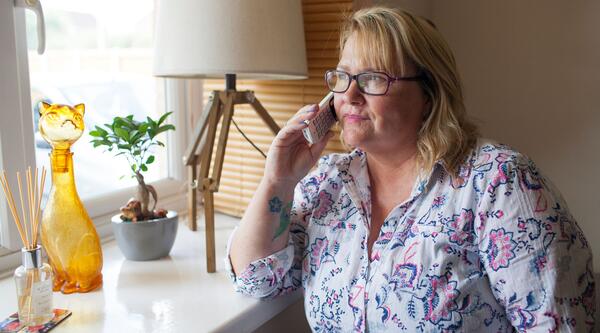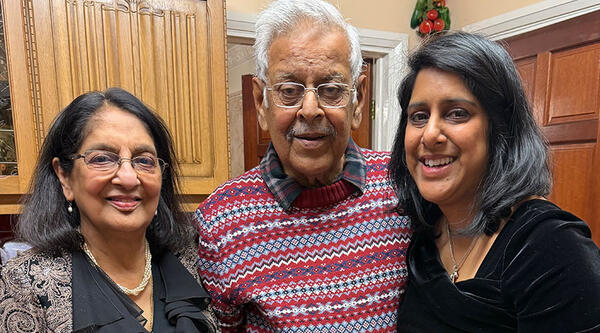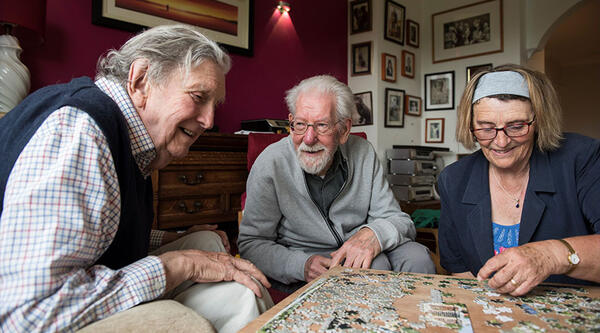How we use information about service users
If you use an Alzheimer's Society service, or have a family member that does, please read about how we use your personal information.
- How we use personal information
- How we use information about employees
- How we use information about volunteers
- How we use information about supporters
- You are here: How we use information about service users
- How we use information about governance participants
How we use your personal information
What is personal data?
Your personal data is information that identifies you, such as your date of birth or your address. It can also be information that reveals something about you, for example information about your dementia diagnosis or your ethnicity. We may also hold health information or other relevant details. Whatever information you give us, we will respect your privacy and your rights.
How and why we use your information
To deliver services you have asked for
With your consent, we will use your personal information to:
- help you decide which services are suitable for you
- help us to work with you to provide the services you receive
- work effectively with other organisations who also provide you with care and support
- help us manage any safeguarding concerns
If you have any concerns about our services, we will use the information you have given us to investigate and answer your query.
To see how effective our work is
We want everyone affected by dementia to know that we are here to give support, help and advice. To achieve this, we will use the information you provide us with to:
- check the quality of our services and make sure they are safe and effective
- help with planning new services.
Occasionally we may ask for your feedback. This is completely voluntary and helps us to improve our services, and to understand where to focus our research and campaigning.
Sharing your information
There are some circumstances when we may share your information with other organisations. These include:
- when you have given us your consent or have asked us to share your information. For example, we may refer you to another organisation that may provide support you would like to receive
- if we are required to by law – for example, passing your details to the police if we agree it is essential to the prevention or detection of a crime
if we feel it is in the vital interests of you or another person, for example in a medical emergency - sharing information for safeguarding purposes, where you or others are at risk of harm. We will inform you that we have shared this information, unless there are exceptional circumstances that would prevent us from doing so. For example, if this disclosure could cause further risk of harm
- when a public commissioning body, where they are entitled (under the Care Act 2014), asks for your information to examine what support we are providing to you, or to deal with a complaint you have made
- when we are providing our services to you as part of an Integrated Care Service. Then, we may share relevant information with other partner organisations. This includes NHS trusts, memory clinics, GPs and other service providers, as part of providing you with the correct support
- when we nominate people for awards or honours, where they have made a significant difference to people affected by dementia. We may share relevant information about them with bodies and organisations to support the nomination. For some external awards or honours, the nominating organisation is asked not to inform the person being nominated.
We do not use your personal data for fundraising or marketing, or share your information with other organisations.
We believe making a difference to people living with or affected by dementia should be acknowledged and rewarded.
We nominate people for awards or honours where they have made a significant difference and we may share relevant information about them with bodies and organisations to support the nomination.
For some external awards or honours the nominating organisation is asked not to inform the person being nominated.
Receiving information from third parties
We will only receive information from third parties about you:
- when you have agreed to be referred to us (for example, by your GP)
- if we reach out to other agencies you are engaged with (with your permission).
In these situations, or in any circumstance not covered by the list above, we will let you know what kind of information the third party has given us about you.
Storing your information
We have secure processes in place to protect all personal information including how we keep and delete it. After your last contact with us, we will keep your information for eight years. Sometimes, for example if the service has been paid for by another organisation, we may need to hold records on the whole service, including your personal data, for longer.
Where your information is held?
We hold most information on our IT system which meets international security standards. We only hold your information in countries where you have the full protection of UK law or its European equivalent. Some information may be kept securely in a paper record format, but where possible we will transfer it to an electronic record and dispose of the paper version.
Security and confidentiality
We take care to make sure your information is secure when we use, store and transmit it. It is only accessed by people who have been verified and authorised to do so. Everyone who accesses your information has had training and is obliged to respect that it is confidential.
Your rights
You have rights about how we use your information. If you get in touch with us, we’ll do our best to respect your wishes.
Consent
If we are using your personal data on the basis of your agreement then, at any time, you can withdraw your consent and we will stop using it.
Other rights
Please contact us if you want any of the following:
- to see what information we hold on you
- to ask for a physical copy of your information
- to ask for corrections to be made
- to ask us to stop using your information in any way
Contact us about any of these requests using the online form for general enquiries or email [email protected] or write to the Information Governance team at the address in the next section.
How to contact us
For any other questions about how we are using your information, please contact our supporter care team by phone on 0330 333 0804
or by email to [email protected].
Our address to write to is:
Alzheimer’s Society
Suite 2
1st Floor East Wing,
Plumer House,
Tailyour Road
Plymouth,
PL6 5FS
You can also use the online form for general enquiries on our website alzheimers.org.uk
Complaints
If you are unhappy with how we are processing your information please contact us using the details outlined above. If you are still unhappy after receiving our response, you can raise your concern with the Information Commissioner’s Office.
If you live outside the UK in Guernsey, please contact Guernsey Data Protection Authority, or if you live in the Isle of Man, please contact Isle of Man Information Commissioner.
If you are using one of our services that is commissioned by a public organisation, then your complaint may be made available to them so that they can address your complaint and our response. Where this applies, you may also complain directly to the commissioning body.








